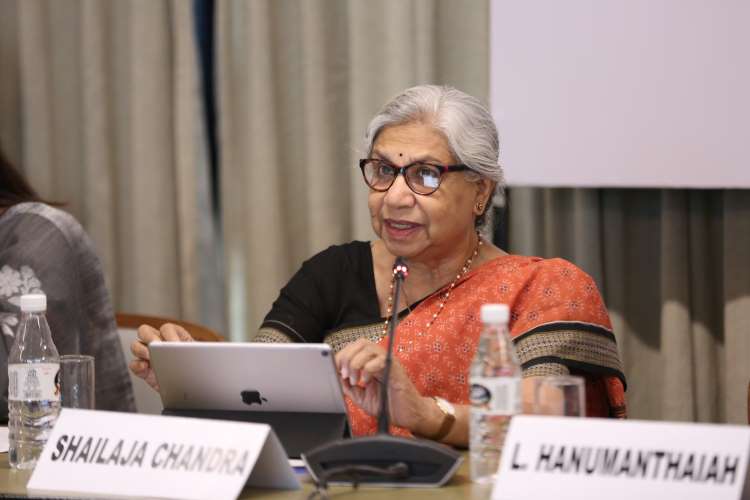When we think of respiratory diseases, we are reminded of the age-old wisdom encapsulated in practices like pranayama and yoga, which have long been celebrated for their abilities to enhance preventive health measures. They serve as a profound reminder that we should embrace every available means to safeguard our well-being. It is imperative that we incorporate such practices into our daily routines.
We need to address a critical issue — one that touches the lives of every individual, regardless of age, gender, or socioeconomic status. We find ourselves navigating the aftermath of the COVID-19 pandemic which has forever altered the world. While healthcare professionals remain vigilant for outbreaks and epidemics, we, as a society, look to our government to formulate policies that protect our health not only from infectious diseases but also from the broader spectrum of health threats. The question that begs our attention is whether we are doing enough. Are our policies truly addressing the root causes of ill health?
READ I Tobacco addiction: Revolutionising quitting with innovation
India’s lung health challenge
World Lung Day, celebrated on September 25 each year, serves as a poignant reminder of the multitude of factors that impact lung health. In our dynamic and rapidly evolving nation, we have witnessed seismic changes in demographics, urbanisation patterns, and economic profiles. However, amid these transformations, a stealthy health burden has been growing relentlessly, often lurking in the shadows. Non-communicable diseases, such as hypertension, cardiovascular diseases, diabetes, and chronic respiratory illnesses, now account for more than 55% of the overall health burden. This piece of statistics is nothing short of staggering, demanding our immediate and unwavering attention.
For years, our healthcare policies were primarily geared towards addressing communicable diseases, with little consideration for the threat posed by non-communicable ailments. However, as our world has evolved, so must our healthcare priorities. Today, we find ourselves grappling with the consequences of this delayed focus as non-communicable diseases continue to escalate, disproportionately affecting the most vulnerable members of the society.
One cannot disregard the pivotal role that air quality plays in this unfolding health crisis. Air pollution, a direct result of factors such as crop residue burning, vehicular emissions, construction dust, and road dust, has emerged as a silent yet lethal adversary. The repercussions of poor air quality are far-reaching, primarily impacting children, the elderly, and individuals with pre-existing respiratory or cardiac conditions. It is imperative that we confront and acknowledge the pernicious effects of air pollution on our health.
Behavioral factors also play a pivotal role in shaping our lung health. The prevalence of tobacco smoking, and indiscriminate use of steroids and antibiotics has risen to alarming levels. The sale of these substances by unqualified medical practitioners and pharmacists continues to pose a significant threat. We must take immediate measures to combat these practices that erode immunity and contribute to a myriad of health issues.
It is not just external factors that affect our lungs. Inside our homes, the burning of biomass, wood, dung, and crop residue for cooking and heating exposes us to harmful pollutants, such as carbon monoxide. It is essential that we address these issues holistically, considering the entire spectrum of factors that affect lung health.
When we talk about lung health, we must also confront the diseases that often follow in its wake. Tuberculosis is one such condition that primarily affects the lungs. Chronic obstructive pulmonary disease (COPD), linked to tobacco smoking and exposure to indoor and outdoor pollutants, remains a pressing concern. Bronchial asthma, with its diverse triggers, further compounds the burden on our lungs. Lung cancer, often linked to tobacco use and exposure to certain air pollutants, underscores the urgency of our mission to protect respiratory health.
In addressing these myriad challenges, we must recognise that collective action is the key. It is incumbent upon us to create robust public awareness campaigns that focus on preventive measures and empower individuals to take charge of their health. Additionally, addressing the issue of crop residue burning and diversifying agricultural practices is essential to curbing pollution. Policymakers must act decisively to incentivise the adoption of eco-friendly alternatives and enforce stringent regulations on air quality.
Moreover, behavioral change is imperative. We must educate our citizens on the dangers of smoking and the misuse of medications. We must promote a culture of responsible antibiotic use and discourage self-medication. Most importantly, we need to prioritise women and children in healthcare initiatives, as they appear to be particularly vulnerable to respiratory conditions.
Lung health is a matter of paramount importance. We must work collectively, across all sectors, to address the multifaceted challenges that impact lung health. The lessons learned from the COVID-19 pandemic underscore the urgency of this mission. Let us not delay any longer. It is time to improve lung health through collective awareness, sound policies, and a commitment to change.

